| FullShot |
|---|
|
|
FullShot
The FullShot Documentary Workshop was established in 1988 as an independent documentary production team. At the time, documentary production was isolated from and unrecognized by Taiwanese society, which had been under martial law from 1949 to 1987. Amidst radical changes in the wave of democratization that followed, FullShot played a vital role in the development of Taiwanese documentaries that in turn stimulated the movement for public media. Their television documentary series Lights of the Human Heart (1990) is considered a masterpiece of Taiwanese television documentary. After its broadcast, FullShot created a mobile film workshop called the Community Documentary Filmmaker’s Training Program in 1991 in response to demand from young people wanting to try their hand at documentary filmmaking. The program was in contact with numerous organizations throughout Taiwan working to loosen constraints on film production. People from a variety of backgrounds—including social workers, the hearing impaired, environmental activists and indigenous people—learned from the program and released their own films. The workshop moved between Taipei, Hualien, Taichung and Kaohsiung every six months. In 1996, the company changed its name to the FullShot Communication Foundation, sponsoring aid and fundraising for the production of its members’ works.
At YIDFF ’99, FullShot and ‘Cinema Juku’ (led by film director Hara Kazuo) gathered in Yamagata for a special program entitled “Case Study: FullShot (Taiwan) and ‘Cinema Juku’ (Japan) / Spreading the Filmmaking Movement.” There, they held screenings of works by each production team and a discussion based on themes such as “Collaborative in Film / Film Collaborative” and “Popular Documentary Movements.”
Production Company, Source: FullShot Communication Foundation
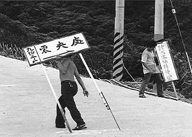 A Taste of Plum
A Taste of Plum
- 2004 / Mandarin, Taiwanese, Hakka / Color / Video / 142 min
Director, Editing: Kuo Hsiao-yun
Photography: Lin Le-shang, Yang Jong-ming
The village of Nangang, near the epicenter of the earthquake in Guosing Township, Nantou County, was buried in a landslide. This film follows the survivors as they try to recover—particularly the three Ju brothers, who have lost their mother and their home. Misplaced expectations lead to confrontations with the government, the village is being turned increasingly into a tourist destination, and in order to put their lives back together, the villagers are even willing to exploit their own experiences of the earthquake. These are lives that cast a life-sized image of Taiwan.
| Kuo Hsiao-yun
Kuo Hsiao-yun began her career after college as an editor and director. She joined FullShot in 1988 and is an administrator, planner and documentary filmmaker. |
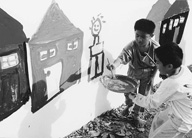 Radio Mihu
Radio Mihu
- 2004 / Mandarin, Tayal / Color / Video / 136 min
Director: Lee Jong-wang
Photography: Tsai Ching-ju
Editing: Lee Jong-wang, Yang Kai-yen
In the Mihu tribe of the indigenous Tayal peoples in Heping Township, Taichung County, the poet and primary school teacher Walis Nogang establishes temporary housing after the earthquake. Based on ideas of traditional, cooperative living, the project aims for independent self-recovery, but discord grows as differences of opinion with elders surface, and the outside attention drawn only to the housing project creates a sense of unfairness among the villagers. While the darker side of humanity is brought into stark relief under the severe conditions following a devastating earthquake, the bright and cheerful voice of the pirate radio station Radio Mihu frames the film, conveying a sense of human strength and hope for the future.
| Lee Jong-wang
After working as a cameraman on TV shows and dramas for five years, Lee Jong-wang founded FullShot with his friends and continues to be active as a cinematographer of 16mm films and documentaries. |
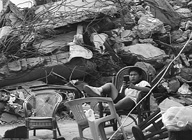 The House Masters
The House Masters
- 2004 / Mandarin, Taiwanese / Color / Video / 89 min
Director: Wu Yii-feng
Photography: Kuo Hsiao-yun, Yang Jong-ming
Editing: Chen Bo-wun
The House Masters records the efforts of the survivors living in Shihmen Village in Guosing Township, Nantou County as they try to help themselves on the road to recovery without media or government aid. The film follows the stubborn attempts of senior residents to go on living in tents. The activities of the residents in a housing complex called “The House Masters” also come into focus as the earthquake exposes the use of inferior construction materials. The elderly eventually pass away in loneliness, while the housing complex residents suing the construction company are confronted with legal contradictions. A final note adding that the trial is still in progress reminds us of the severe difficulties faced on the road from disaster to recovery.
| Wu Yii-feng |
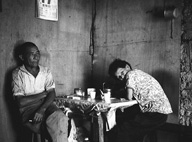 An Encounter with Chungliao
An Encounter with Chungliao
- 2005 / Mandarin, Taiwanese / Color / Video / 356 min
(Part 1: 139 min, Part 2: 99 min, Part 3: 118 min)
Director: Huang Shu-mei
Photography: Yang Jong-ming, Lin Le-shang
Editing: Sun Chung-hui, Yang Kai-yen
An Encounter with Chungliao was carefully shot in the huge areas struck by the earthquake in Chungliao Township, Nantou County. Unaffected camerawork depicts an avalanche of problems afflicting the area—the historical decline of a town that once prospered on bananas during the Japanese occupation, a village forced to scatter for the installation of high-voltage electricity towers, the environmental pollution that occurred as a result of allowing for urban waste dumps, and the deforestation that arose from planting high-profit crops. This film goes beyond simply documenting the recovery process.
| Huang Shu-mei
Huang Shu-mei joined FullShot as an intern in 1990. In addition to making documentaries such as the series Lifestyle Images, she has been in charge of documentary promotion and the arrangement of documentary screenings in rural areas since 1992. |
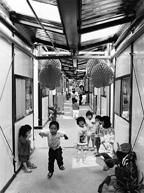 Three Fork Village
Three Fork Village
- 2005 / Mandarin, Tayal / Color / Video / 144 min
Director: Chen Liang-feng
Photographic Advisor: Lee Jong-wang
Photography: Tsai Ching-ju
Editing: Lin Chin-hui
This film documents the events in Three Fork Village, a small village of the Tayal people who migrated fifty years ago from the Mihu tribe in Radio Mihu. After the earthquake forced the entire village to relocate, the villagers encounter a succession of ups and downs in the process of reconstructing their homes. As a typhoon causes further water damage, the camera not only follows the reconstruction efforts of the villagers, but it also questions the essence of the problems that have hindered reconstruction in the five years since the disaster.
| Chen Liang-feng
Joining FullShot in 1994, Chen Liang-feng is involved with documentary filmmaking and the support of disadvantaged groups and communities. Three Fork Village is her directorial debut. |
